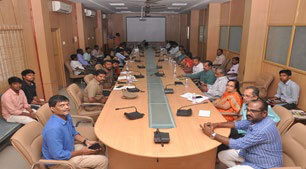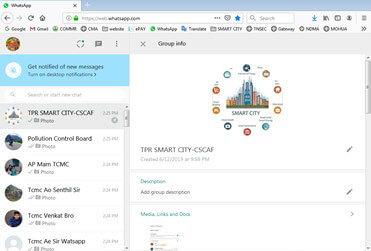Tiruppur Smart City CEO, Mr. K. Sivakumar. M.A. strategized with the key personnel, Chief Data Officer (CDO), and the Nodal officers regarding the CSCAF categories and their indicators. The data required for the indicators were available with various departments as well as from online resources.
In order to collect all the relevant information on the CSC-AF indicators, correlating with the current scenario in the city and then uploading them on the portal seemed a herculean task. The CEO proposed to convene line department meetings on a weekly basis to facilitate with the data collection and a format was given to the respective departments for data acquisition.
In the meeting, line department data coordinators were assigned with the task of collecting the required data in the format provided. The names of the data coordinators and the details of their responsibilities are listed below. Data coordinators and additional team members are nominated from the home department and their names are also listed out next. During the meeting, the CDO and the Nodal officer instructed the concerned officials about their duties and responsibilities of the data coordinators. They were advised to engage additional team members to get the details regarding the various categories listed out in the CSC-AF.


In the meeting, the sectors and the respective indicators were explained and clarified in detail. Since the timelines were very strict, a WhatsApp group was formed with all the data coordinators, team members, and climate change committee members to exchange knowledge, transfer of information and clarifying their doubts. The CDO and Nodal officer participated in all VCs by the Joint Secretary and Mission Director – Smart Cities. The CDO and Nodal officer conducted weekly meetings with the line departments and NGOs to collect the details of the indicators.
The CSC-AF regional workshop held in Chennai, conducted on 20th July 2019 by the Ministry, demonstrated in real-time the data to be uploaded in the portal. The interaction and exchange of information with the sector experts of the Ministry enhanced the understanding of the data points and evidence required.
After participating in the workshop, CSCAF-related works were further taken into action and improved by forming a Committee whose members oversaw the data upload into the portal. Their names are as follows:
Committee Members
Conclusion
With continuous follow-up, robust planning, and coordination with different departments, the Smart City team was able to optimize the data and evidence required, and clarified any doubts that came up with the coordinating teams. Even though providing updated current data for many of the indicators was a challenge, Tiruppur Smart City adopted a proactive and participatory approach, carefully combining both top-down and bottom-up of measures to ensure an efficient data upload process.
This herculean task was efficiently completed within the stipulated period, with the coordination of the line departments and home department data coordinators, additional team members, NGOs, and Climate Change Committee members.